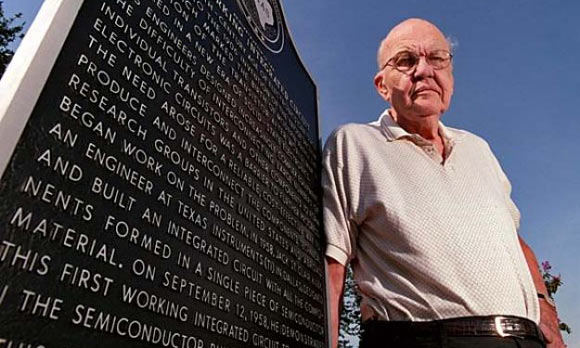Jack Kilby invented “Integrated Circuit”
Born on 8th November, 1923, Jack St. Clair Kilby was an American electrical engineer who took part in the realization of the first integrated circuit, along with Robert Noyce. He was born in Jefferson City, Missouri, and was raised in Great Bend, Kansas, where he was brought up amongst the industrious descendants of the western settlers of the American Great Plains.
John Kilby’s father ran a small electric company, and his goal was to do, whatever it took, to help people and run his business. His father worked with amateur radio operators and this is what mainly sparked Kilby’s interest in electronics. He was also a fan of broadcast radio.
He studied electrical engineering at the University of Illinois. Most of his classes were in electrical power, but due to his childhood interest in electronics, he also took some vacuum tube engineering physics classes. He graduated in 1947. Later, in Milwaukee, Wisconsin, he worked at an electronics manufacture that made parts for radios, televisions and hearing aids. He pursued a master’s degree in electrical engineering from the University of Wisconsin, taking evening classes.
In the year 1958, Kilby and his wife moved to Dallas, Texas, when he took up a job with Texas Instruments. It was the only company that approved to let him work on electronic component miniaturization.
After receiving a director’s position at Texas Instruments, Kilby took a leave in 1970, though continuing to work with the company even after his retirement in the year 1983. He handled solar power-based research and joined the faculty at Texas A&M University.
While working at TI, Jack Kilby was able to design an integrated circuit, combining previously isolated electronic elements to work together in a miniature environment that would be known as the microchip. His invention was considered revolutionary for the computing/technological world and it marked the beginning of devices that have now become a basic part of life.
Jack Kilby also invented the first pocket calculator, which was nicknamed “Pocketronic” back then, along with the thermal printer.
The Institute of Electrical and Electronic Engineers (IEEE) has recognized many of Kilby’s great works.
He was awarded the following:
- IEEE David Sarnoff Award in 1966
- Co-recipient of the first IEEE Cledo Brunetti Award in 1978
- The IEEE Centennial Medal in 1984
- The IEEE Medal of Honor in 1986
- He was co-recipient of the Franklin Institute’s Stuart Ballantine Medal in 1966
- He received the Holley Medal from the American Society of Mechanical Engineers (ASME) in 1982 and 1989
- He was elected to member of the National Academy of Engineering (NAE) in 1967, where he received the Academy’s Vladimir K. Zworykin Award in 1975
- Co-recipient of the first NAE’s Charles Stark Draper Prize in 1989
- The National Medal of Science in 1969 and the National Medal of Technology in 1990
- In 1982, he was inducted into the National Inventors Hall of Fame
- In 1993, he was awarded the prestigious Kyoto Prize by the Inamori Foundation
- He was awarded both the Washington Award and the Eta Kappa Nu Vladimir Karapetoff Award in 1999
- In 2000, he was awarded the Nobel Prize in Physics for his breakthrough discovery
- Jack Kilby was awarded nine honorary doctorate degrees from Universities including Southern Methodist University, the University of Miami, University of Illinois, University of Wisconsin-Madison, Texas A&M University, Yale and Rochester Institute of Technology
- In 1998 – certificate of Honorary Professorship from the National Chiao Tung University (NCTU) in Taiwan
- The Kilby Center, which is a research center at Texas Instruments for silicon manufacturing, is named after him
- The Jack Kilby Computer Centre at the Merchiston Campus of Edinburgh Napier University in Edinburgh is also named in his honor
The Kilby International Awards were also named in Jack Kilby’s honor and it is exclusively funded by the generous donations of the founding committee, private philanthropists, corporations, and international institutions. Their support is assisting the creation of innovative programs which benefit under-served students throughout the world.
